学术英语(社科)_Unit1含答案演示课件.ppt
- 格式:ppt
- 大小:1.19 MB
- 文档页数:69
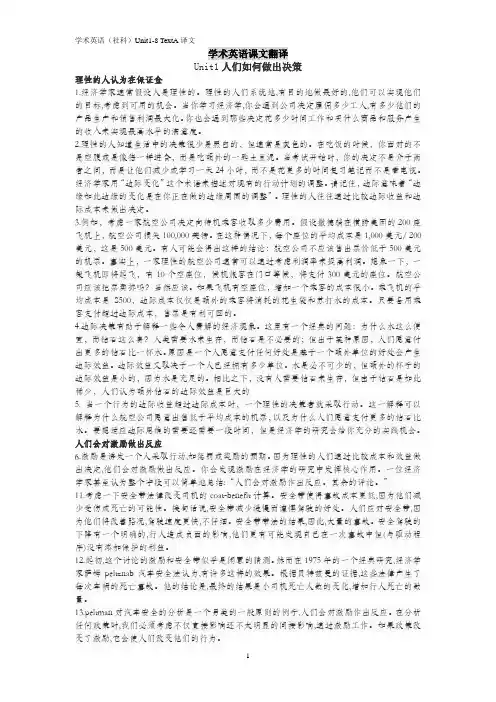
学术英语课文翻译Unit1人们如何做出决策理性的人认为在保证金1.经济学家通常假设人是理性的。
理性的人们系统地,有目的地做最好的,他们可以实现他们的目标,考虑到可用的机会。
当你学习经济学,你会遇到公司决定雇佣多少工人,有多少他们的产品生产和销售利润最大化。
你也会遇到那些决定花多少时间工作和买什么商品和服务产生的收入来实现最高水平的满意度。
2.理性的人知道生活中的决策很少是黑白的,但通常是灰色的。
在吃饭的时候,你面对的不是空腹或是像猪一样进食,而是吃额外的一匙土豆泥。
当考试开始时,你的决定不是介于两者之间,而是让他们减少或学习一天24小时,而不是花更多的时间复习笔记而不是看电视。
经济学家用“边际变化”这个术语来描述对现有的行动计划的调整。
请记住,边际意味着“边缘如此边缘的变化是在你正在做的边缘周围的调整”。
理性的人往往通过比较边际收益和边际成本来做出决定。
3.例如,考虑一家航空公司决定向待机乘客收取多少费用。
假设撒德躺在横跨美国的200座飞机上,航空公司损失100,000英镑。
在这种情况下,每个座位的平均成本是1,000美元/ 200美元,这是500美元。
有人可能会得出这样的结论:航空公司不应该售出票价低于500美元的机票。
事实上,一家理性的航空公司通常可以通过考虑利润率来提高利润。
想象一下,一架飞机即将起飞,有10个空座位,候机旅客在门口等候,将支付300美元的座位。
航空公司应该把票卖掉吗?当然应该。
如果飞机有空座位,增加一个乘客的成本很小。
乘飞机的平均成本是S500,边际成本仅仅是额外的乘客将消耗的花生袋和苏打水的成本。
只要备用乘客支付超过边际成本,售票是有利可图的。
4.边际决策有助于解释一些令人费解的经济现象。
这里有一个经典的问题:为什么水这么便宜,而钻石这么贵?人类需要水来生存,而钻石是不必要的;但出于某种原因,人们愿意付出更多的钻石比一杯水。
原因是一个人愿意支付任何好处是基于一个额外单位的好处会产生边际效益。


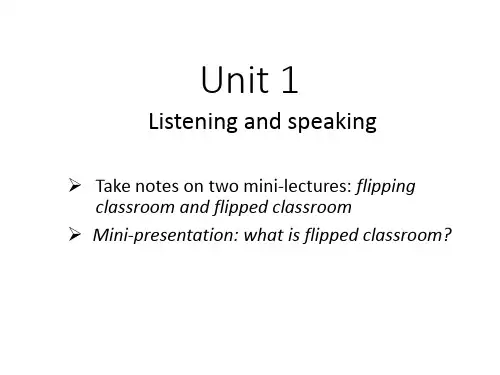
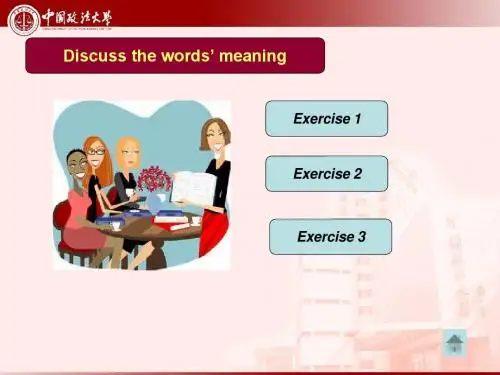
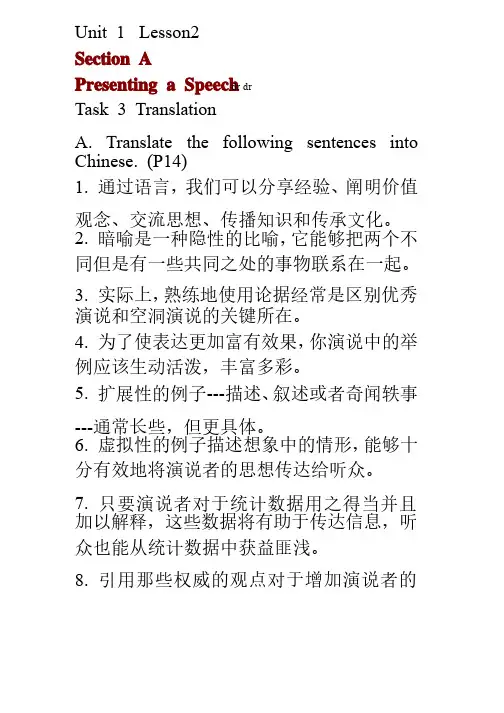
Unit 1 Lesson2 Section APresenting a Speech dr drTask 3 Translation A. Translate the following sentences into Chinese. (P14) 1. 通过语言,我们可以分享经验、阐明价值观念、交流思想、传播知识和传承文化。
2. 暗喻是一种隐性的比喻,它能够把两个不同但是有一些共同之处的事物联系在一起。
3. 实际上,熟练地使用论据经常是区别优秀演说和空洞演说的关键所在。
4. 为了使表达更加富有效果,你演说中的举例应该生动活泼,丰富多彩。
5. 扩展性的例子---描述、叙述或者奇闻轶事---通常长些,但更具体。
6. 虚拟性的例子描述想象中的情形,能够十分有效地将演说者的思想传达给听众。
7. 只要演说者对于统计数据用之得当并且加以解释,这些数据将有助于传达信息,听众也能从统计数据中获益匪浅。
8. 引用那些权威的观点对于增加演说者的可信度来说是一种好方法。
可信度来说是一种好方法。
9. 语言是演说者展示才能的工具。
对于他们来说,如同其他职业的工具一样,语言也有特殊的功用。
特殊的功用。
10. 演说的表达方式基本上有四种:通读手稿中的段落,复述背诵过的一段文章,幻灯片辅助的演说,即兴发挥的演说。
片辅助的演说,即兴发挥的演说。
B. Translate the following passage into Chinese. (P15) 发言提纲是有效发言的基础。
发言提纲是有效发言的基础。
通过写发通过写发言提纲,你可以确保你的想法是相关联的,言提纲,你可以确保你的想法是相关联的, 你的思路是从一点谈到另一点,你的思路是从一点谈到另一点,你的讲话结你的讲话结构是连贯的。
通常,准备讲演你可以采用两种提纲方式:详细准备提纲和简单发言提纲。
纲。
在准备提纲中,在准备提纲中,应该写出你的特定目的应该写出你的特定目的及中心思想,及中心思想,并以连贯的方式确定主要观点并以连贯的方式确定主要观点和次要观点。

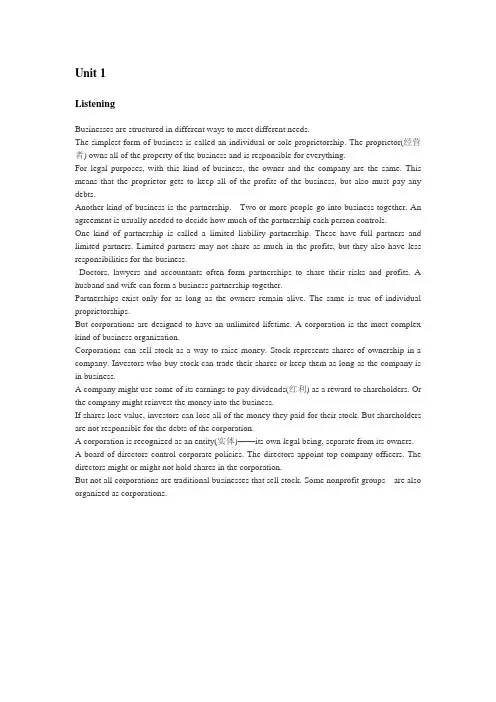
ListeningBusinesses are structured in different ways to meet different needs.The simplest form of business is called an individual or sole proprietorship. The proprietor(经营者) owns all of the property of the business and is responsible for everything.For legal purposes, with this kind of business, the owner and the company are the same. This means that the proprietor gets to keep all of the profits of the business, but also must pay any debts.Another kind of business is the partnership. Two or more people go into business together. An agreement is usually needed to decide how much of the partnership each person controls.One kind of partnership is called a limited liability partnership. These have full partners and limited partners. Limited partners may not share as much in the profits, but they also have less responsibilities for the business.Doctors, lawyers and accountants often form partnerships to share their risks and profits. A husband and wife can form a business partnership together.Partnerships exist only for as long as the owners remain alive. The same is true of individual proprietorships.But corporations are designed to have an unlimited lifetime. A corporation is the most complex kind of business organization.Corporations can sell stock as a way to raise money. Stock represents shares of ownership in a company. Investors who buy stock can trade their shares or keep them as long as the company is in business.A company might use some of its earnings to pay dividends(红利) as a reward to shareholders. Or the company might reinvest the money into the business.If shares lose value, investors can lose all of the money they paid for their stock. But shareholders are not responsible for the debts of the corporation.A corporation is recognized as an entity(实体)——its own legal being, separate from its owners.A board of directors control corporate policies. The directors appoint top company officers. The directors might or might not hold shares in the corporation.But not all corporations are traditional businesses that sell stock. Some nonprofit groups are also organized as corporations.Script for listening taskTask 1 p40-41Keys:1.BACDA2.particular; concrete; in the light of the past; outside his regard; as near the earth as a politicianListeningKeys to After-class tasksTask 2FTFFScript for listening:People differ in many ways. One difference is in how attractive they are. The actor Brad Pitt, for instance, is a handsome man. In part for this reason, his movies attract large audiences. Not surprisingly, the large audiences mean a large income for Mr. Pitt.How prevalent are the economic benefits of beauty? Labor economists Daniel Hamermesh and Jeff Biddle tried to answer this question in a study published in the December 1994 issue of The American Economic Review. Hamermesh and Biddle examined data from surveys of individuals in the United States and Canada. The interviewers who conducted the survey were asked to rate each respondent’s physical appearance. Hamermesh and Biddle then examined how much the wages of the respondents depended on the standard determinants --- education, experience, and so on--- and how much they depended on physical appearance.Hamermesh and Biddle found that beauty pays. People who are deemed to be more attractive than average earn five percent more than people of average looks. People of average looks earn five to 10 percent more than people considered less attractive than average. Similar results were found formen and women.What explains these differences in wages? There are several ways to interpret the ―beauty premium‖.One interpretation is that good looks are themselves a type of innate ability determining productivity and wages. Some people are born with the attributes of a movie star; other people are not. Good looks are useful in any job in which workers present themselves to the public--- such as acting, sales, and waiting on tables. In this case , an attractive worker is more valuable to the firm than an unattractive worker. The firm’s willingness to pay more to attractive workers reflects its customers’ preferences.A second interpretation is that reported beauty is an indirect measure of other types of ability. How attractive a person appears depends on more than just heredity. It also depends on dress, hairstyle, personal demeanor, and other attributes that a person can control. Perhaps a person who successfully projects an attractive image in a survey interview is more likely to be an intelligent person who succeeds at other tasks as well.A third interpretation is that the beauty premium is a type of discrimination, a topic to which we return later.ListeningKeys to textbook tasks1.demography; the scientific study of population2.standard measures; births; deaths; the number of those moving in and out; generalstatistics; identify trends1.the number of births per 1000 people in a given year2.the number of deaths per 1000 people in a given year3.the number of live births per 1000 women of the world4.18Listening script:The scientific study of population is known as demography. The word comes from the Greek for ―measuring people‖. But counting heads is only a small part of what demographers do. They also attempt to calculate the growth rate of a population and to assess the impact of such things as the marriage rate and life expectancy, the sex ratio, the age structure on human behavior and the structure of society. They are interested in the distribution of population and in movements of people. Put another way, demographers study the effects of such numbers on social trends.Demographers use a number of standard measures in translating a locality’s raw totals--- births, deaths, the number of those moving in and out--- into general statistics that allow them to identify trends. The birthrate is the number of births per 1000 people in a given years. Suppose there were 900 births in a city of 50000 in a specific year. Demographers calculate the birthrate for the city by dividing the number of births (900) by the population (50000) and multiplying the result (0.018) by 1000 to get 18. The birthrate in developed countries is 1.6; in less developed countries it is 4.0. The death rate is the number of deaths per 1000 people in a given year. The fertility rate is the number of live births per 1000 women of the world. As mentioned earlier, population and population growth rates are highest in developing nations and lower in Western nations. These rates are also complicated by mass movements of refugees to and from certain countries. By 1994 the population of refugees was over 23 million, up from about 10 million refugees worldwide in 1983. Mass movements of people into and out of Afghanistan, Somalia and Mozambique have contributed to this sharp increase. Famine and political upheaval are usually behind these mass exoduses.ListeningTask 11) culture identity 2) ethnic identity3) cultural group 4) ethnic group2.1) Culture identity embodies standards of behavior and the ways in which beliefs, values, and attitudes are transmitted to the younger generation. It also entails the ways in which kinship relationships and marital and sexual relationships are structured.2) Ethnic identity refers to the geographic origin of a minority group within a country or culture.3) Cultural group refers to a set of people who embrace core beliefs, behaviors, values, and norms and transmit them from generation to generation.4) Ethnic group is a set of people who are embedded within a larger cultural group or society and who share beliefs, behaviors, values, and norms that are also transmitted from generation to generation.DictationOne’s cultural identity is an important aspect of being human. Cultural identity evolves from the shared beliefs, values, and attitudes of a group of people. It embodies standards of behavior and the ways in which beliefs, values, and attitudes are transmitted to the younger generation. Cultural identity also entails the ways in which kinship relationships and marital and sexual relationships are structured. Examples of the vast array of cultural identities in the United States include Anglo American, Italian American, African American, and Asian American – to name just a fewScript:One’s cultural identity is an important aspect of being human. Cultural identity evolves from the shared beliefs, values, and attitudes of a group of people. It embodies standards of behavior and the ways in which beliefs, values, and attitudes are transmitted to the younger generation. Cultural identity also entails the ways in which kinship relationships and marital and sexual relationships are structured. Examples of the vast array of cultural identities in the United States include Anglo American, Italian American, African American, and Asian American – to name just a few.Cultural identity transcends ethnic identity, or ethnicity, which refers to the geographic origin of a minority group within a country or culture. Whereas many people learn about their specific ethnic identities from their parents, many more children are born with parents from several ethnic groups. As this increases in the United States, more young people are unclear about their ethnic identityand are simply calling themselves American.A cultural group is a set of people who embrace core beliefs, behaviors, values, and norms and transmit them from generation to generation. Most cultures contain subgroups called co-cultures, distinct cultural of social groups living within the lesbians. An Ethnic group is a set of people who are embedded within a larger cultural group or society and who share beliefs, behaviors, values, and norms that are also transmitted from generation to generation. Ethnicity plays a major role in determining what we eat and how we work, relate, celebrate holidays and rituals, and feel about life and death an illness.Unit 6ListeningKeys to textbook tasksTask 11.1) blogger: someone’s online record of the websites he or she visits.2) Web logger: one-person Internet blabbermouths who pop off to anyone who will listen2.1). TV has coped well with technological change2). almost 37 hours a week watching television3). people are constantly messaging and tweeting about them, and discussing them on Facebook.4). more than two million in America last year5). more than 600 today6). paying for greater television choiceScript:Task 1Internet journalism has been greatly influenced by the so-called ―bloggers‖. In the strict sense, a blogger is someone’s online record of the websites he or she visits. Blogger is a contraction of ―Web logger‖. Web loggers have been called one-person Internet blabbermouths who pop off to anyone who will listen. They criticize each other but some of the best take on, sometimes unfairly, the big newspapers and networks. They provide a kind of instant feedback loop for media corporations. Some equate them with the more lively editorial pages of earlier times. Web loggers are having an important impact on the ―old media‖as well as on public opinion over salient political and social issues.Task 2Newspapers are dying; the music industry is still yelping about iTunes; book publishers think they are next. Yet one bit of old media seems to be doing rather well. In the final quarter of 2009 the average American spent almost 37 hours a week watching television. Earlier this year 116 million of them saw the Super Bowl-- a record for a single programme. Far from being cowed by newmedia, TV is colonizing it. Shows like ―American Idol‖and ―Britain’s Got Talent‖draw huge audiences partly because people are constantly messaging and tweeting about them, and discussing them on Facebook.Advertising wobbled during the recession, shaking the free-to-air broadcasters that depend on it. But cable and satellite TV breezed through. Pay-television subscriptions grew by more than two million in America last year. The explosive growth of cable and satellite TV in India explains how that country has gone from two channels in the early 1990s to more than 600 today. Pay-TV bosses scarcely acknowledge the existence of viewers who do not subscribe to multichannel TV, talking only of people who have ―yet to choose‖ a provider. This is not merely bluster. As our special report this week explains, once people start paying for greater television choice, they rarely stop.Unit 7ListeningTask 11) puts a barrier up2) just the connection3) quite unreliable4) could break at any momentTask 2FFTFTScript:Interviewer: Today’s ―big story‖ is the Information Society. We’ll focus on some of the issues and, of course, the language behind the top ic. ―Information and communications technology‖, the ―information society‖, the ―digital divide‖--- these terms have become buzz words in the modern world. But what do they all mean?Interviewee: This is a way of looking how society has changed. If we look back to a hundred years ago, we were talking about the Industrial Revolution--- countries becoming economic powers, developing their businesses through the use of machines. Now the emphasis has shifted to information, and technology is a tool by which people can gain that information--- be it through computers, on the Internet, or maybe over a mobile phone. And that’s what we are talking abut here: using technology as a tool to get ac cess to information, to find out what’s happening in the world.Interviewer: And why is this such an important area? Why does it feature in the list of World Service Big Stories, do you think?Interviewee: Say you are a farmer in Senegal, and you want to find out what the price is for the mangos or the pineapples that you’re growing. When you come to sell them to the trader, you don’t know what the price of that pineapple is in the capital. You have to take, at face value, what you’re offered for it. But sa y you had a mobile phone, and that on that mobile phone, you could find out what the price of pineapples was in the capital, that would put you in a much stronger position when it came to selling your goods, and you would get a much better price for your crops. That would make a very big difference to how much money you earned every month.Interviewer: So let’s say we’re talking about telephones and computers as you’ve suggested, what do we mean when we say there’s a ―digital divide‖?Interviewee: this all comes down to having access to information--- being able to find information about crop prices, about the latest research, even news about what’s happening in your country or in your part of the world easily. In industrialized countries it’s all around us. Apart fromnewspapers and radio stations, we now have the Internet, or you can even get this sort of information on your mobile phone. The problem for developing countries is that they don’t have access to that information.Interviewer: Success in the modern world depends on having access to up-to-date information--- whether for business, farming, education, healthcare--- for every aspect of life. And in this so-called ―information society‖, there’s a digital divided between the haves and the have-nots---- those who are able to access information and those who aren’t. But the ability to access information depends on more than just having the right technological equipment.Interviewee: there are several big problems wen it comes to the internet access. One of the big ones is that a lot of the material on the Internet is in English, and that instantly puts a barrier up to a lot of people in the world because they have to speak at least some English to understand the information there. The other thing is just the connection. To connect to the Internet, you need to connect either through cables or you can do it through radio waves. But in many parts of the developing world, what you have is a very slow connection over a telephone line. Telephone lines in a lot o f these parts of the world are quite unreliable, they’re a bit crackly, they might have some interference on the line. So what you then have is an Internet connection that, not only is slow, but could break at any moment. This is a huge problem for the developing countries.Interviewer: We’ve talked a bit about the Internet, then, the difference that can make to people’s lives. What about the phone? And particularly the mobile phone?Interviewee: This is almost more revolutionary than the Internet itself. B ecause what you’re finding now is that in countries like Nigeria, almost everybody will have a mobile phone. In the past they would have had to rely on trying to get a normal landline, something connected with wires to the local exchange, and the problem i s there wouldn’t be many of these telephones, they would expensive. But now mobile phones are opening the world of communication to just about everybody. So, selling goods is easier; sharing ideas is much more possible now than in the past; or even just giving advice to colleagues or friends.Unit 8ListeningKeys to After-class tasksSummaries:politically correct means socially correct according to the views of those who were politically left of center. There are three kinds of political correctness. Type A refers to new ways of saying things, avoiding giving offence to members of minority groups. For examples, person is preferred to man/woman, Ms to Miss/Mrs and physically challenged to disabled. Type B refers to terms used to attack those thought to be politically incorrect. Words such as sexist, racist, Eurocentric are examples. Type C refers to terms indicating a positive program for addressing wrongs. Expressions such as multiculturalism and affirmative action are cases in point.Listening scriptWell, good evening ladies and gentlemen. I’m giving a talk on political correctness. Can you hear me at the back?What is political correctness? What is it? Well, let’s look at the appearance of the term. In the 1980s, in the United States, then in this country, we suddenly had a number of strange inventions in the language. For example, The Washington Post newspaper, on 12th of March 1984, we read about a writer called Langer. Langer is saying that novelists have a duty higher than the one they owe to their art, that is the art of writing, of course, and in their private vision of world, they havea duty to be politically correct. And again The Washington Post in the following year, ―it is the only caffeinated coffee served by the waitpersons,‖ they’re called in the politically correct Tacoma Café in Tacoma Park. Well, what’s all this about? What does politically correct mean in its sense? Well, I would suggest in the original sense in the States, politically correct meant socially correct according to the views of those who were politically left of center. It was a descriptive term.Now let’s look at some examples of politically correct language. There are at least three categories, I suggest, of politically correct language. Let’s call them A, B and C. So A. There are new ways of saying things, avoiding giving offense to members of minority groups. Now what’s a minority group here? A group referred to as a minority is one which is in ways disadvantaged or oppressed. So the traditional categories here of minority group would include women, and in some countries blacks, perhaps the elderly and so on. So the new way of saying things, for, instead of ―man‖ or ―woman‖, we could say ―person‖. That would be politically correct usage because it is regarded as discriminatory to distinguish between men and women, we’re all persons. Or again, it became very fashionable to use ―Ms‖, ms, instead of ―Miss‖ or ―Mrs.‖ as a title for a woman. Or again ―s’he‖, or ―he/she‖, that, in place of ―he‖ or ―she‖. Or again, ―black‖ or ―negro‖. The quality of the language here is rather important. Blacks, themselves, in the States came to dislike the term ―negro‖, preferring to be called Black, with a capital ―B‖. Again, of ―poor‖, poor people, we talk of ―disadvantaged‖ people or perhaps ―exploited‖, but ―disadvantaged‖ seems more neutral. Then, what about male homosexuals, for example? Well, the term ―gay‖changed its meaning dramatically. ―Gay‖ used to mean cheerful, happy and so on, but now, it’s normally, it’s taken to mean male homosexual. Then there is the suffix ―challenged‖. So, some people would say, not ―disabled‖, perhaps somebody has a damaged leg, not ―disabled‖but ―physically challenged‖. And for ―old‖, we might say ―experientially enhanced‖, or something of that sort. So, so much for ways of saying things without giving offence to minority groups.Next among these examples, Category B, let’s call it. Terms to attack those thought to be politically incorrect. Now, such terms are very important weapons and can be sued to destroy a person’s reputation. So, for example, ―sexist‖, a sexist is somebody who talks disparagingly of a woman or worse. A ―racist‖ is somebody who regards himself or themselves as a member of a superior race. An ―ageist‖ is somebody, normally not always, a hostile suffix. If you say someone is sexist, racist, ageist or whatever, you are attacking them. You’re attacking them as morally uncouth. Then, there are other terms used in attacking offensive people in politically correct method. For example, ―Eurocentric‖. A Eurocentric person is somebody who thinks that European culture is the center of world culture and talks and behaves as if that were so. European culture is somehow superior to the cultures of other centers. Or a ―homophobe‖. Have you heard this term? Homophobe is somebody who is said to discriminate against homosexuals. Phobe, P H O B E, being the Greek root for somebody who dislikes or fears something.A third category, let’s call it C here, for example, terms indicating a positive program for addressing wrongs. For example, ―multiculturalism‖. Now, multiculturalism is the attitude which recognizes many centers of cultural interest in the world rather than only a white male Anglo-Saxon, or European, at it were. And ―affirmative action‖is another expression which is used to indicate putting things right that are wrong. So affirmative action might include promoting people with the advantaged groups and so on.。


学术英语理工教师手册Unit 1Choosing a TopicI Teaching ObjectivesIn this unit , you will learn how to:a particular topic for your researcha research questiona working title for your research essayyour language skills related with reading and listening materials presented in this unitII. Teaching Procedureson a topicTask 1Answers may vary.Task 21 No, because they all seem like a subject rather than a topic, a subject which cannot be addressed even by a whole book, let alone by a1500-wordessay.2Each of them can be broken down into various and more specific aspects. For example, cancer can be classified into breast cancer, lung cancer, liver cancer and so on.Breast cancer can have such specific topics for research as causes for breast cancer, effects of breast cancer and prevention or diagnosis of breast cancer.3 Actually the topics of each field are endless. Take breast cancer for example,we can have the topics like:Why Women Suffer from Breast Cancer More Than Men?A New Way to Find Breast TumorsSome Risks of Getting Breast Cancer in Daily LifeBreast Cancer and Its Direct Biological ImpactBreast Cancer—the Symptoms & DiagnosisBreastfeeding and Breast CancerTask 31 Text 1 illustrates how hackers or unauthorized users use one way or another toget inside a computer, while Text 2 describes the various electronic threats acomputer may face.2 Both focus on the vulnerability of a computer.3 Text 1 analyzes the ways of computer hackers, while Text 2 describes securityproblems of a computer.4 Text 1: The way hackers“get inside” a computerText 2: Electronic threats a computer facesYes, I think they are interesting, important, manageable and adequate.Task 41Lecture1:Ten Commandments of Computer EthicsLecture 2:How to Deal with Computer HackersLecture 3:How I Begin to Develop Computer Applications2Answersmay vary.Task 5Answers may vary.2 Formulating a research questionTask 1Text 3Research question 1: How many types of cloud services are there and what are they?Research question 2: What is green computing?Research question 3: What are advantages of the cloud computing?Text 4Research question 1: What is the Web ?Research question 2: What are advantages and disadvantages of the cloud computing? Research question 3: What security benefits can the cloud computing provide?Task 22 Topic2: Threats of Artificial IntelligenceResearch questions:1)What are the threats of artificial intelligence?2)How can human beings control those threats?3)What are the difficulties to control those threats?3 Topic3: The Potentials of NanotechnologyResearch questions:1)What are its potentials in medicine?2)What are its potentials in space exploration?3)What are its potentials in communications?4 Topic4: Global Warming and Its EffectsResearch questions:1)How does it affect the pattern of climates?2)How does it affect economic activities?3)How does it affect human behavior?Task 3Answers may vary.3 Writing a working titleTask 1Answers may vary.Task 21 Lecture 4 is about the security problems of cloud computing, while Lecture 5 isabout the definition and nature of cloud computing, hence it is more elementary than Lecture 4.2 The four all focus on cloud computing. Although Lecture 4 and Text 4 address thesame topic, the former is less optimistic while the latter has more confidence inthe security of cloud computing. Text 3 illustrates the various advantages of cloud computing.3 Lecture 4: Cloud Computing SecurityLecture 5: What Is Cloud Computing?Task 3Answers may vary.4 Enhancing your academic languageReading: Text 1the words with their definitions.1g 2a 3e 4b 5c 6d 7j 8f 9h 10iwords listed 2. Complete the following expressions or sentences by using the targetbelow with the help of the Chinese in brackets. Change the form if necessary.1 symbolic 2distributed3site4complex 5identify6fairly 7straightforward 8capability 9target10attempt11process 12parameter13interpretation14technical15range 16exploit17networking18involve19 instance 20specification 21accompany22predictable23profile3. Read the sentences in the box. Pay attention to the parts in bold.Now complete the paragraph by translating the Chinese in brackets. You may refer to the expressions and the sentence patterns listed above.ranging from(从⋯⋯到)arise from some misunderstandings leaves a lot of problems unsolved opens a path for(打开了通道)requires a different frame of mind (来自于⋯⋯ 解)(留下很多没有得到解决)(需要有新的思想)the following sentences from Text 1 into Chinese.1)有些人声称黑客是那些超越知疆界而不造成危害的好人(或即使造成危害,但并非故意而),而“ 客”才是真正的坏人。

UNIT 1 A Doctor’s LifeTeaching ObjectivesAfter learning Unit 1, students (Ss) are expected to accomplish the following objectives:Teaching Activities and ResourcesPart 1 ReadingText ALead-inSuggested teaching plan1.Start the class by sharing your experiences with doctors.2.Brainstorming task:1)Ask Ss to brainstorm what they know about a doctor’s life and practice.2)Write down the key words on the chalkboard.3)Ask Ss to have a short discussion on different aspects of a doctor’s life. Ssare encouraged to use the key words in discussion.The following is a list of suggested key words:3.Make a summary on the discussion and introduce the topic of Text A.Text ComprehensionSuggested teaching plan1.When preparing for and planning the class, the teacher (T) can search “doctor’slife” on the Internet and find out what people say and think about a doctor’s life.Start the class by introducing the findings. This is a natural continuation of Lead-in.2.Analyze the text and lead Ss to discuss, integrating Task 2 / Critical reading andthinking / Text A into analysis and discussion. The presentation topics should be assigned to individual Ss for preparation at least one week in advance. Ask other Ss to preview the text with the guidance of the presentation topics.3.Integrate Task 2/ Language building-up/ Text A when a parentheticalstatement is dealt with.4.When analyzing the text, ask Ss to pay special attention to the sentences listed inLanguage focus below.5.If time allows, ask Ss to do Task 1 / Critical reading and thinking / Text A inabout five minutes. Check out the task by asking one or two Ss to read their answers. This is done to get an overview about the text.Language focus1.… that one stray request from a patient—even one that is quite relevant—might send the delicately balanced three-ring circus tumbling down. (P2, Para. 1)两个破折号之间是插入语,补充说明病人冷不丁提出的要求(stray request)也可能是相当中肯的(relevant),即便如此,对聚精会神的医生来说也是“灾难性的”。